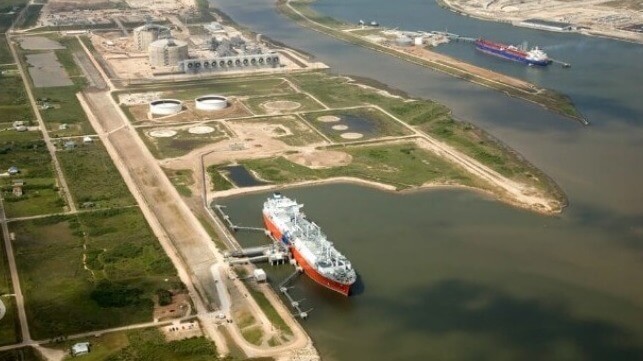Congress Members Renew Call for Bill Requiring US Ships for Energy Exports

A bipartisan group of U.S. senators and members of the House of Representatives is renewing their calls for legislation first proposed nearly a decade ago to require portions of U.S. energy exports to be transported on vessels built in the U.S. They argue the bill which has failed to gain traction in the Congress in the past would be good for the U.S. economy, the shipbuilding, shipping, and energy industries, and national security.
The current version of the bill, known as the “Energizing American Shipbuilding Act,” would require U.S.-built vessels to be used in an increasing portion of the energy exports. It would require U.S.-built ships to transport 15 percent of total seaborne LNG exports by 2043. It would also require 10 percent of total seaborne crude oil exports to travel by 2035 on U.S.-built ships.
The push comes as the U.S. continues to increase its LNG exports and competes with Qatar and Australia as the world’s largest exporter. The United States exported more LNG than any other country in the first half of 2023, according to a September 2023 report from the U.S. Energy Information Agency. They cited data showing that U.S. LNG exports averaged 11.6 billion cubic feet per day (Bcf/d) during the first half of the year, up four percent from 2022 and above the 10.6 Bcf/d from Australia and 10.4 Bcf/d from Qatar. The restoration of exports from Freeport LNG contributed to the growth and the strong global demand is contributing to efforts to increase capacity at Freeport LNG as well as other projects along the Gulf Coast.
“There is a global energy demand and if the United States does not step up to the plate, our adversaries will fill the void,” said Senator Roger Wicker of Mississippi. “This bill would support American shipbuilding and pay dividends for the Magnolia State (Mississippi).”
Senators Wicker and Bob Casey of Pennsylvania introduced one version of the bill. In the House of Representatives, Congressmen John Garamendi of California and Rob Wittman of Virginia introduced companion legislation.
According to the sponsors, this legislation would increase the United States exports of LNG and crude oil on American-built, flagged, and crewed vessels, and, subsequently, it would expand the domestic shipbuilding industrial base. They argue if enacted, the bill is expected to spur the construction of dozens of ships, supporting thousands of good-paying jobs in American shipyards, while also boosting domestic vessel component manufacturing and maritime industries.
“While I support the long-term transition to a global economy powered by clean energy, I believe strongly that any continued U.S. exports of petroleum and natural gas should be on American-built vessels,” said representative Garamendi. “American shipyards and mariners are ready for the job, and our bipartisan bill ensures they are no longer expected to compete against heavily subsidized foreign shipyards in Korea, China, and elsewhere.”

that matters most
Get the latest maritime news delivered to your inbox daily.
The sponsors justify the move by citing 1995 legislation that required that all crude oil exported from Alaska’s North Slope be transported on U.S.-flagged vessels. They say that the bill was good for the U.S. industry and the new effort would have a similar positive impact. The bill does not address issues ranging from the cost differential of building ships in the U.S. to the lack of shipyard capacity and the lack of U.S. sailors which for example led tanker operator OSG to recently call for providing more American mariners by making it possible for foreigners to work on U.S. ships. OSG’s proposal has been resounding criticized by the unions and others in the industry.
Garamendi and Wicker have been proposing versions of this legislation since at least 2016. They originally called for a requirement that 30 percent of American LNG and crude oil exports to be carried on U.S.-flagged vessels after 2025, but later changed it to require U.S.-built vessels. In 2018, they reintroduced the proposal changing it to 10 percent of American crude exports after 2032, and 15 percent of American LNG exports after 2040. The following year, they tried to have the requirement added to the ongoing trade negotiations with China.
